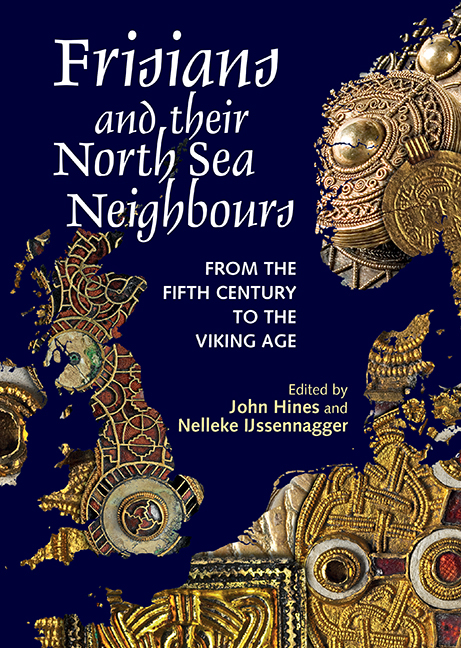Book contents
- Frontmatter
- Contents
- List of Figures
- List of Tables
- Preface
- Acknowledgements
- Linguistic Conventions and Abbreviations
- Abstracts
- Introduction: Frisians – Who, When, Where, Why?
- 1 Palaeogeography and People: Historical Frisians in an archaeological light
- 2 The Anglo-Frisian Question
- 3 Frisian between the Roman and the Early Medieval Periods: Language contact, Celts and Romans
- 4 ‘All quiet on the Western Front?’ The Western Netherlands and the ‘North Sea Culture’ in the Migration Period
- 5 Power and Identity in the Southern North Sea Area: The Migration and Merovingian Periods
- 6 How ‘English’ is the Early Frisian Runic Corpus? The evidence of sounds and forms
- 7 The Geography and Dialects of Old Saxon: River-basin communication networks and the distributional patterns of North Sea Germanic features in Old Saxon
- 8 Between Sievern and Gudendorf: Enclosed sites in the north-western Elbe–Weser triangle and their significance in respect of society, communication and migration during the Roman Iron Age and Migration Period
- 9 Cultural Convergence in a Maritime Context: Language and material culture as parallel phenomena in the early-medieval southern North Sea region
- 10 The Kingdom of East Anglia, Frisia and Continental Connections, c. ad 600–900
- 11 A Comparison of the Injury Tariffs in the Early Kentish and the Frisian Law Codes
- 12 Cultural Contacts between the Western Baltic, the North Sea Region and Scandinavia: Attributing runic finds to runic traditions and corpora of the Early Viking Age
- Index
11 - A Comparison of the Injury Tariffs in the Early Kentish and the Frisian Law Codes
Published online by Cambridge University Press: 25 August 2018
- Frontmatter
- Contents
- List of Figures
- List of Tables
- Preface
- Acknowledgements
- Linguistic Conventions and Abbreviations
- Abstracts
- Introduction: Frisians – Who, When, Where, Why?
- 1 Palaeogeography and People: Historical Frisians in an archaeological light
- 2 The Anglo-Frisian Question
- 3 Frisian between the Roman and the Early Medieval Periods: Language contact, Celts and Romans
- 4 ‘All quiet on the Western Front?’ The Western Netherlands and the ‘North Sea Culture’ in the Migration Period
- 5 Power and Identity in the Southern North Sea Area: The Migration and Merovingian Periods
- 6 How ‘English’ is the Early Frisian Runic Corpus? The evidence of sounds and forms
- 7 The Geography and Dialects of Old Saxon: River-basin communication networks and the distributional patterns of North Sea Germanic features in Old Saxon
- 8 Between Sievern and Gudendorf: Enclosed sites in the north-western Elbe–Weser triangle and their significance in respect of society, communication and migration during the Roman Iron Age and Migration Period
- 9 Cultural Convergence in a Maritime Context: Language and material culture as parallel phenomena in the early-medieval southern North Sea region
- 10 The Kingdom of East Anglia, Frisia and Continental Connections, c. ad 600–900
- 11 A Comparison of the Injury Tariffs in the Early Kentish and the Frisian Law Codes
- 12 Cultural Contacts between the Western Baltic, the North Sea Region and Scandinavia: Attributing runic finds to runic traditions and corpora of the Early Viking Age
- Index
Summary
This paper aims to compare the injury tariff found in the Law of King Æthelberht of Kent (the Kentish Law or Ab) dated c. ad 600 with the injury tariffs in the Frisian legal tradition. This tradition comprises both the injury tariffs in the Lex Frisionum, written mainly in Latin towards the end of the 8th century, and the tariffs written down in Old Frisian law manuscripts dating from the 13th to 15th centuries. Close cultural and linguistic connections have been observed between Anglo-Saxon England and Frisia. Furthermore, a sometimes exclusive relation between Kent and Frisia has been suggested. In this paper I scrutinize these connections with regard to injury tariffs. In addition, I look into the status of research and where the possibilities for future research lie. It will become clear that trying to find exclusive Anglo-Frisian parallels or even reconstruct an Anglo- Frisian proto-tariff is useful but also tantalizing: the goal seems within our reach but we never quite get there.
Honour and revenge
Injury tariffs are texts in which various types of possible injuries and harms that can be inflicted on a person are listed, accompanied by an amount of money which was due to the victim. Their nature and origins are discussed in more detail in the following section. Before discussing them, and why the Kentish and Frisian traditions deserve to be compared, however, the rationale behind injury tariffs needs to be addressed. Essentially, the goal of these texts was to make it possible to buy off revenge. They are a product of the institution of blood money (wergild: ‘man price’ in Germanic), allowing a killer to pay a certain amount in goods (money, valuables, land, cattle, houses) to the next of kin of the victim of a homicide. Paying blood money can obviate a blood feud in which many lives would be lost and which could disrupt a society for years (Netterström and Poulsen eds 2007). Combined with ritual acts and taking a certain amount of time (Miller 2006, 108), sometimes even as much as a year, the institution of wergild effectively makes it possible to restore peace between two families. Blood money is in use by various cultures all over the globe.
- Type
- Chapter
- Information
- Frisians and their North Sea NeighboursFrom the Fifth Century to the Viking Age, pp. 223 - 242Publisher: Boydell & BrewerPrint publication year: 2017

